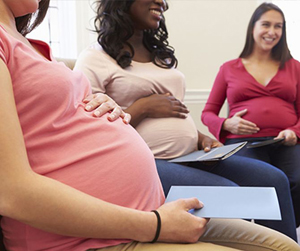First and third trimester weight gain has little effect on twins’ birth weight, NIH study suggests

A woman's weight gain in the second trimester of a twin pregnancy is most closely associated with fetal growth and the size of the babies at the time of birth, according to a prospective study by researchers at the National Institutes of Health. The investigators also found that weight gain in the first and third trimesters is not linked to fetal growth or birth weight. The study results provide reassurance for women who fail to gain weight during the first trimester, often because of the greater likelihood of morning sickness in a twin pregnancy.
The study, appearing in the American Journal of Clinical Nutrition, was conducted by Stefanie Hinkle, Ph.D., and colleagues at NIH's Eunice Kennedy Shriver National Institute of Child Health and Human Development (NICHD).
Background
The study authors noted that there is little information available to guide women pregnant with twins on how much weight they should gain in pregnancy and during which part of pregnancy they should gain it. Twin pregnancies place higher nutritional demands on women to, among other things, provide the additional blood volume and tissue needed to support another fetus.
Earlier studies have focused on the total amount of weight gained during twin pregnancies. Because most twins are born early, information on weight gain at the end of pregnancy is of limited use for advising and treating women earlier in pregnancy.
Results
The researchers enrolled 171 women pregnant with twins between the 8th and 13th weeks of pregnancy. They performed six ultrasound exams of the fetuses at pre-specified intervals over the course of the pregnancies and used these exams to estimate fetal weight. The team found that maternal weight gain in the first 13 weeks was not associated with fetal weight of the twins at 14 weeks, but maternal weight gain from 14 to 20 weeks and from 21 to 27 weeks was associated with fetal weight at 21 and 28 weeks, respectively. Maternal weight gain from 28 to 34 weeks was not associated with the birth weight of the twins.
Significance
These findings underscore the importance of weight gain in twin pregnancies during the second trimester, given that many twins are delivered before a pregnancy has reached term. Compared to normal weight infants, low birth weight infants are at higher risk for health problems.
Next Steps
The findings provide important information for future studies directed at helping women pregnant with twins to gain weight during the second trimester.
Reference
Hinkle, SN, et al. Maternal weight gain and associations with longitudinal fetal growth in dichorionic twin pregnancies: a prospective cohort study. American Journal of Clinical Nutrition. doi: 10.3945/ajcn.117.158873

 BACK TO TOP
BACK TO TOP